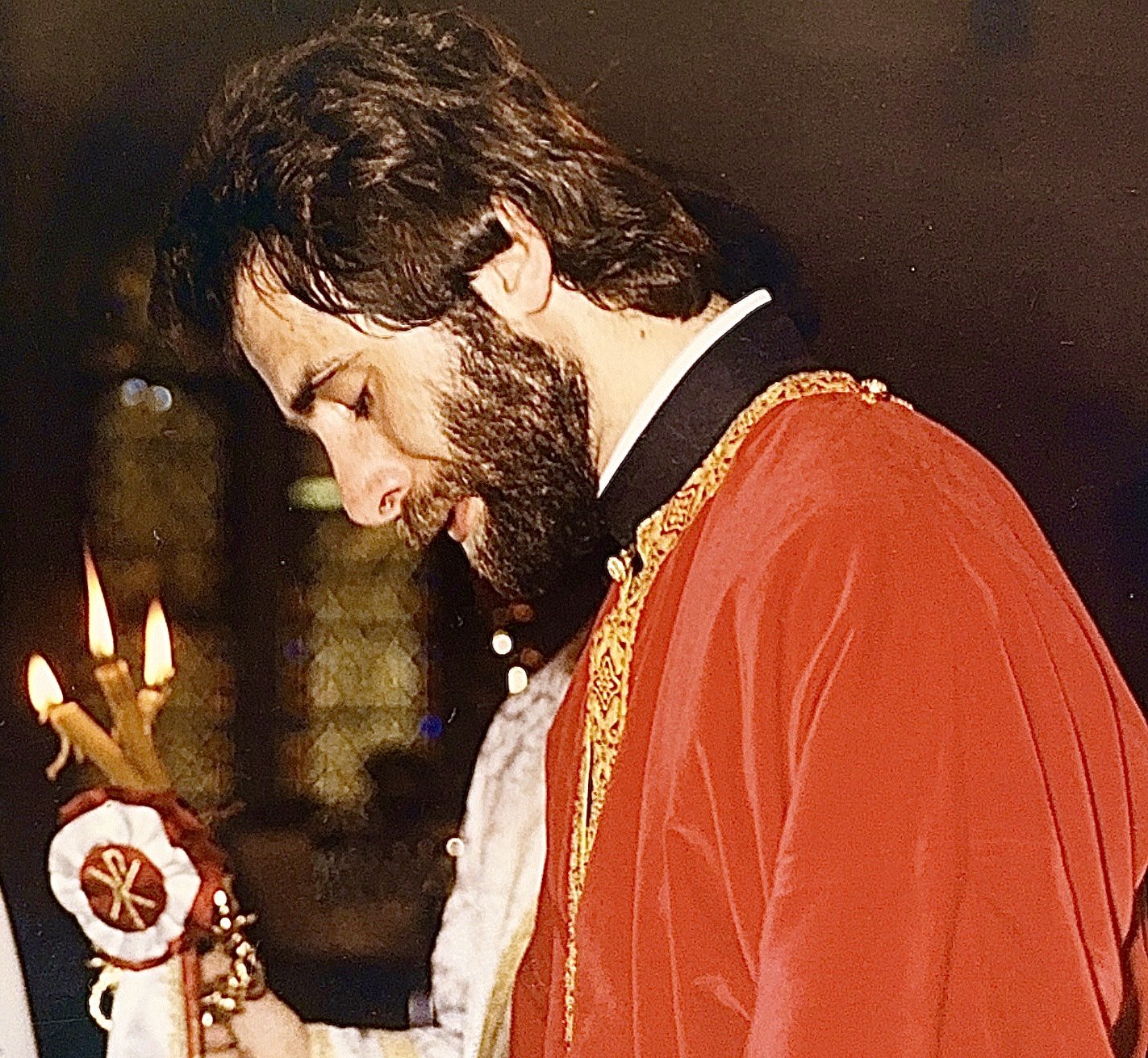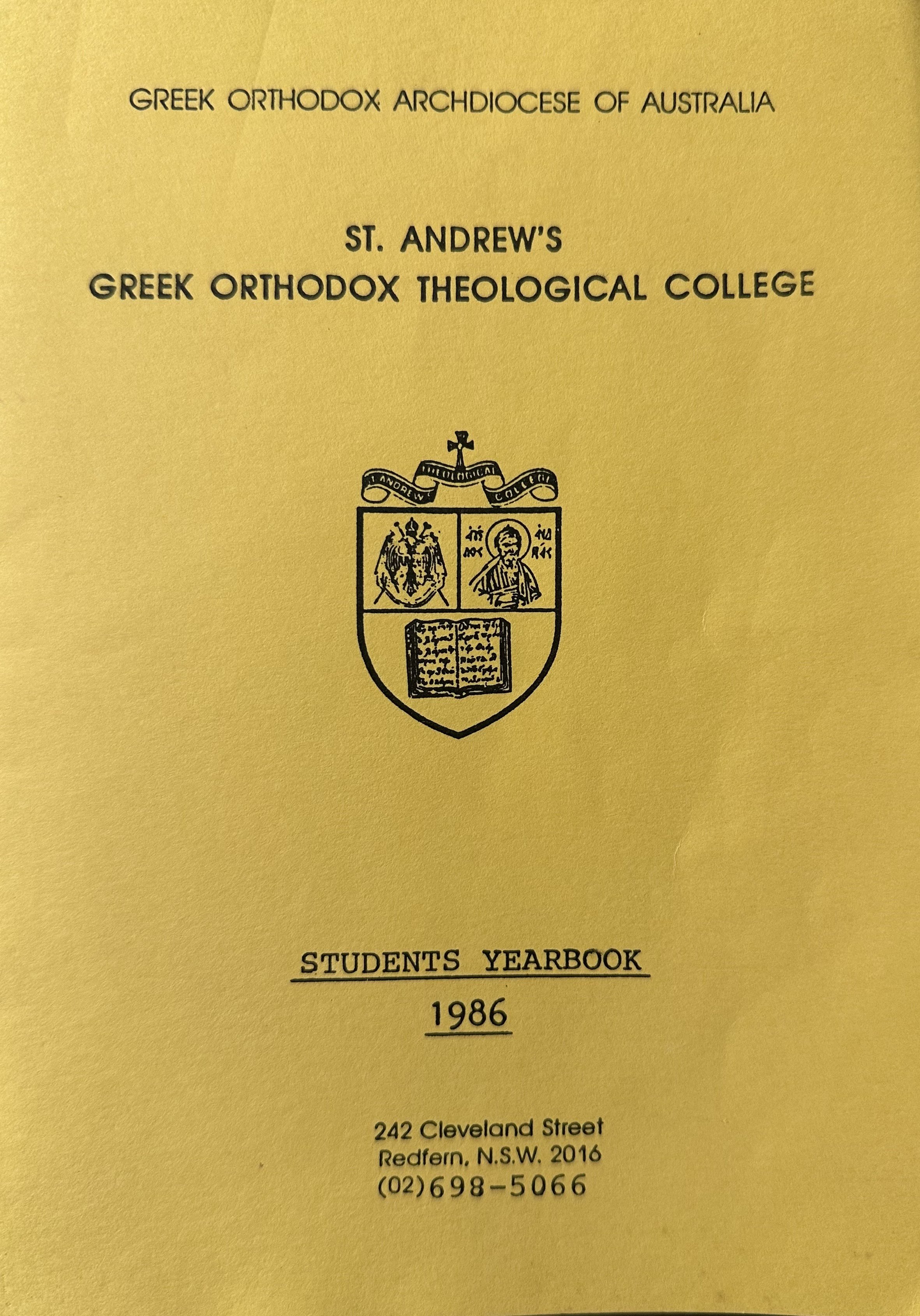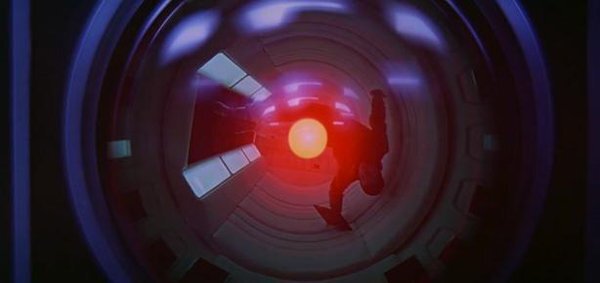Seminary: The most difficult thing would be to change ourselves
/Sydney-Gerringong
In Sydney this morning I had an interesting encounter with a young person at a bookstore when the conversation for one reason turned to seminaries (from the Latin seminarium for “seed plot”). Chance meetings can prove a catalyst to go back into past stories of our lives. I hope one day that I might be able to write down my own seminary experience, the place where some of us go that we might receive an education in theology. It is only afterwards we learn those places are in reality but a training ground for spiritual survival. Even now and after almost four decades, it is not an easy thing for me to revisit this period of my life. Allow me, if you will, to share but a small reflection going back to those times.
This college is unique—and it belongs to all of us. It could be said that it has an Australian body, a Greek mind, a bilingual tongue, and a heart that is distinctively Orthodox. (Dimitri Kepreotes, SAGOTC Students Yearbook, 1988)
Following the final address of our Archbishop Stylianos, His Eminence Metropolitan Maximos read a warm message from His Holiness Patriarch Demetrios. This concluded the official opening and dedication of our new College; the dream was over and the reality of it all was just about to begin. (Spiros Haralambous, SAGOTC Students Yearbook, 1986)
Around fourteen young men of different dispositions and backgrounds started out in our first year of seminary in 1986 as the inaugural class of this new theological school in Australia (being an Eastern Orthodox institution and an accredited member of the Sydney College of Divinity SCD it was the first of its kind in the Southern Hemisphere). Some of us believed we were going to change the world. No more than a few weeks had passed and then there were nine. The “Messiah Complex” which afflicts a large number of seminarians did not last long. We were enthusiastic but hugely foolhardy in our aspirations. Those of us left after that initial loss of numbers were compelled to lower our original enthusiasm and expectations. Now it was simpler, or so we thought, how are we going to change the already compressing atmosphere of our new place of learning. Surely, we could at least do this—could we not? No, not even this. It is true I also discovered, what a discerning soul once said about seminaries, that they will (as a rule) “relegate Jesus to the background.” Not too many more weeks would pass and then we were down to seven.
Finally, let it be said that nothing good comes easy: should you be sincere in studying a “faithful theology” be prepared to carry thy cross. (M. G. Michael (Ed.), SAGOTC Students Yearbook, 1986)
We have triumphed in that we have grown and learnt to accept not only our responsibilities, but our limitations as well, to be more sensitive to our brother’s needs, to realize the importance of study—more importantly, to kneel in prayer. We have failed in that we could have been less assertive, less demanding, slower to anger and reprove, more humble. (Fr. Jeremiah Michael (Ed.), SAGOTC Students Yearbook 1988)
At the start of the second year two more of the younger seminarians would leave. We were now officially down to the “pioneering five”, as our little group would come to be known. As time progressed and each one of us would do battle with their own particular demons and personal disappointments, we arrived at the hardest and most difficult realization of them all—the most difficult thing would be to change ourselves. Metanoia does not play games. I should have known better. I was one of the older seminarians, a former police officer and already a graduate of another academic institution. I was twenty-five years old. Yet, even I would fall into these deep traps. Now, almost forty years later, I continue to fight with the last of these admissions—that indeed, the road to the restoration of the self is not only arduous but also long-lasting. Which, I must confess, has not become any easier and not for any lack of belief. Unless we learn to forgive but more importantly ask to be forgiven, we will not make spiritual progress. Human nature is terribly complex and we can be deceived even by the noblest of our ideals and intentions. So, please, give each other the room and space to grow and to evolve. Who among us has not been broken? The Japanese art of kintsugi has a great deal to teach us. We cannot ever fully know the background story of another soul’s journey or how our actions might adversely hurt them. These things, as well, you learn in a seminary. To teach the Divine Word, and to preach the Gospel, the “Good News”, is not to be taken lightly:
Not many of you should become teachers, my fellow believers, because you know that we who teach will be judged more strictly. (Jm. 3:1)
Outside some of the basics which we were able to collect over the four years of study (alas to afterwards even mangle many of those lessons), there remain two enduringly meaningful compensations from that time. First, we have the spirit within us to endure through almost anything so long as we have a reason, that is, a “meaningfulness” to persevere. Second, the most beautiful gift we can offer the other is compassion, that is, to “suffer with the other”—and that any pastoral theology however impressive in its exposition bereft of this charism is entirely, and absolutely without meaning. Lest, I have discouraged any soul from attending seminary (and this is certainly not my intention) there will be great days of spiritual delight, too, when you will believe with all of your heart and mind that here in this place—the sometimes “furnace”—is precisely where you had to come. You will learn to pray if indeed this is the desire of your heart and you will fall to your knees in earnest supplication. Studying theology is good. Practising the content of theology is even better. My only purpose here to forewarn you it is an arena where you must be well prepared to engage in spiritual warfare, at times brutal, with the self and the “bad” side of the ego. Pressures will arrive from every side. You will in all likelihood lose friends. You will be betrayed by some in whom you have placed your trust and perhaps had even loved. Your passions will surely be magnified. We come to seminaries wanting to be a Bonhoeffer or a Spurgeon or a Saint Maximus the Confessor, and then reality hits home hard. Above all let us work diligently on our own piece of clay and where we can help the other to do the same. For this is our lifelong task. Along the lines of what Carl Jung termed, “individuation” (the process of self-realization). We are made in the “image” but we forever work towards the “likeness”. I have thought of Christ’s “forty days and forty nights” (Matt. 4:1-11) in the desert as an analogy in some ways to the seminarian’s own testing—and especially if it leads to the priesthood.
All five who remained were ordained. Of these five, one would later ask to be relieved of their Holy Orders. This fellow was me. A decision, I must also confess, one cannot ever rightly find peace with. Particularly, if you belong to a believing community with entrenched religio-cultural values which are parts of each other. Yet, there is no escaping the fact that I took my hand off the plough and I will one day have to give an account to my Lord. Though I have referred to myself as a theologian, I do not wish to be known as one. The word alone, theologos (“one who speaks of God”), terrifies me for its implications and for the truth that I have every day fallen short of the mark. I am, indeed, the very least of the brethren. It is enough to ponder on the grace and mercies of our Creator. To be occasionally filled with an overwhelming awe—and to find opportunities to share this awe of the “tremendous mystery” with our neighbour. During our long walks down by the edge of the Pacific, that I might keep in practice, our beautiful husky, Mishka, will listen patiently as I ‘sermonize’ to her on the vitalness of endurance. Other times I will preach to the fish and the rocks and the trees, for all things are moving towards their transfiguration. This has now been my ‘captive’ congregation since the time of my exile. The photo which I have posted here after much toing and froing, I had not been able to hold for a long time. It is fine now. I have come to be grateful for that hour. I have understood a lot more of that journey in the ensuing years. And why it was necessary for me to cross this path. In spite of that, good things are never too far away for as the Scriptures say: “And we know that in all things God works for the good of those who love him, who have been called according to his purpose” (Rom. 8:28).
MG Michael Family Archives



